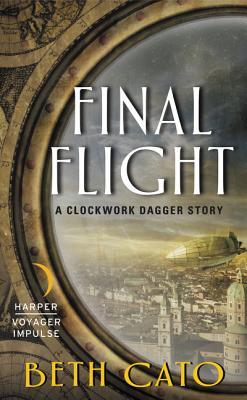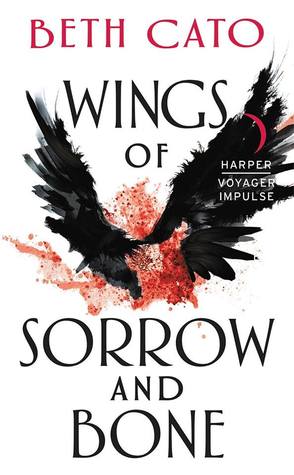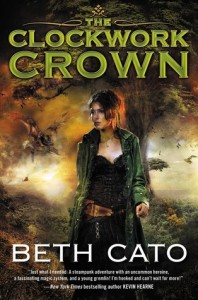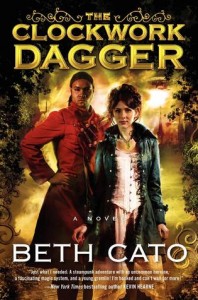 Final Flight (Clockwork Dagger, #2.6) by Beth Cato
Final Flight (Clockwork Dagger, #2.6) by Beth Cato Formats available: ebook
Series: Clockwork Dagger #2.6
Pages: 48
Published by Harper Voyager Impulse on April 26th 2016
Purchasing Info: Author's Website, Publisher's Website, Amazon, Barnes & Noble, Kobo
Goodreads
Another breathtaking short story from the author of The Clockwork Dagger and The Clockwork Crown, set in the same world…
Captain Hue hoped he was rid of his troubles once Octavia Leander and Alonzo Garrett disembarked from his airship Argus. But he was quickly proved wrong when his ship was commandeered by Caskentian soldiers. He is ordered on a covert and deadly mission by the smarmy Julius Corrado, an elite Clockwork Dagger.
Now Captain Hue must start a mutiny to regain control of his airship, which means putting his entire crew at risk—including his teenage son Sheridan. As the weather worsens and time runs out, it’ll take incredible bravery to bring the Argus down….perhaps for good.
My Review:
I just finished this and I’m still reeling a bit. Final Flight is an absolute stunner, and I don’t believe that you have to have read the rest of the Clockwork Dagger stories to get caught up in its emotional punch. The characters in this book were very much not even secondary characters in the main series. More like tertiary. Or even further down the chain. So while the background is there, there isn’t much connection to the main events.
Instead, this is a tightly packed little story about the costs and horrors of war, told in a very insular and isolated setting. Which makes the punch that much harder.
Captain Hue’s airship has been commandeered again, but this time by his own government. And even though it was dragooned by the enemy during previous events, this particular loss of control feels much slimier. The Wasters were generally polite. They did the minimum amount of damage and caused the minimum amount of disruption. If they hadn’t held his son at knife-point to make sure that their orders were obeyed, he’d probably forgive the whole episode.
His own government, on the other hand, is clearly planning on using death magic for some unholy purpose, and he wishes he could have nothing to do with any of it. But his own government is now holding him and his ship effectively hostage, on a secret mission that feels dirtier and more disgusting by the second. He wants it to be over and his ship and crew to be his again.
Instead, he’s ordered to take his ship to a place where airships simply don’t go, to deliver a mysterious package and supposedly be set free. But his government has already stolen the ship’s only possible means of survival. It is clear to every sailor aboard that their own government intends for them to literally crash and burn on this mission, killing everyone aboard in a remote area where no one will ever find the ship or the bodies.
It’s the ultimate in deniability. And the Captain and his crew decide that they just won’t stand for it. A slim chance at life is better than the absolute certainty of death. And it is better to die free than tainted by whatever evil is being hatched by his own people.
Escape Rating A: The emotional wallop packed by this tiny story is intense. I’m still blinking back a few tears. There are so many questions here, and very few of them end up with answers. Including the ultimate fate of the crew.
The Captain’s government believes that the can strike one decisive blow against their enemy, and that killing a large number of people in one single blow will bring about a swift end to the war in their favor.
To this reader, it sounds a bit like discussions about the dropping of the atomic bombs on Hiroshima and Nagasaki.
There’s a difference, or so it feels. In this fictional world, the pursuit of their ends has justified any nefarious means, including the murders of vast swaths of their own people, in order to power the death magic encased in their doomsday weapon. While the makers of the atomic bomb took some serious shortcuts with safety, and they were certainly playing with dangers that were not yet fully understood, the way that the doomsday weapon in this story is created is much different. It would be as if one of the components of the bomb required thousands of irradiated corpses to manufacture, and if the bomb makers were deliberately quarantining small, remote towns of their own people in order to “harvest” that ingredient. The doomsday weapon in this story literally feels terrifyingly dirty to anyone who is even near it, because they can actually feel the horror of the deaths that went into making it.
In the end, the power of this story is in its emotional heft. The way that the crew comes together as a family to decide their own fate, instead of letting their fate be handed to them by others. They have decided that the ends do not justify the means.
I think it says something about who both sides of this war are that the person that his government is trying to stop is a healer, and that the methodology they plan to use to stop her involves harvesting the deaths of thousands of their own people.
At the last, this story reminds me a bit of, surprisingly, 9/11. Not the attacks on the Twin Towers, but United Airlines Flight 93, the plane that went down in Pennsylvania because its passengers fought back against the hijackers. It made me wonder if some of the thoughts weren’t the same, that it was better to go down fighting than to go down in an obscene act of terrorism. When those are the only choices, we all want to believe that we will do what we can, even in extremis, for what seems like, if the greater good is not an available option, then for the least of the available evils.

 Wings of Sorrow and Bone: A Clockwork Dagger Novella by
Wings of Sorrow and Bone: A Clockwork Dagger Novella by  I absolutely adored the
I absolutely adored the  All Rivka wants is to be a machinist. She has a way with machines, and absolutely no facility for noble small talk or feminine frippery. Escaping from a dull society partner and her grandmother’s watchful eye, Rivka finds herself in the company Tatiana Garret. Tatiana is the younger sister of Alonzo Garret, the hero of Dagger and Crown. Alonzo is assisting the great medician Octavia Leander as she runs for her life. He’s also fallen in love with her.
All Rivka wants is to be a machinist. She has a way with machines, and absolutely no facility for noble small talk or feminine frippery. Escaping from a dull society partner and her grandmother’s watchful eye, Rivka finds herself in the company Tatiana Garret. Tatiana is the younger sister of Alonzo Garret, the hero of Dagger and Crown. Alonzo is assisting the great medician Octavia Leander as she runs for her life. He’s also fallen in love with her.
